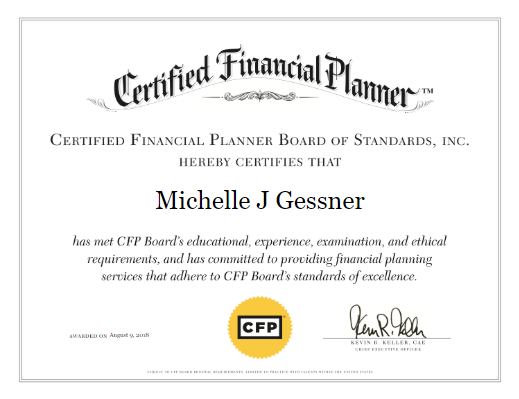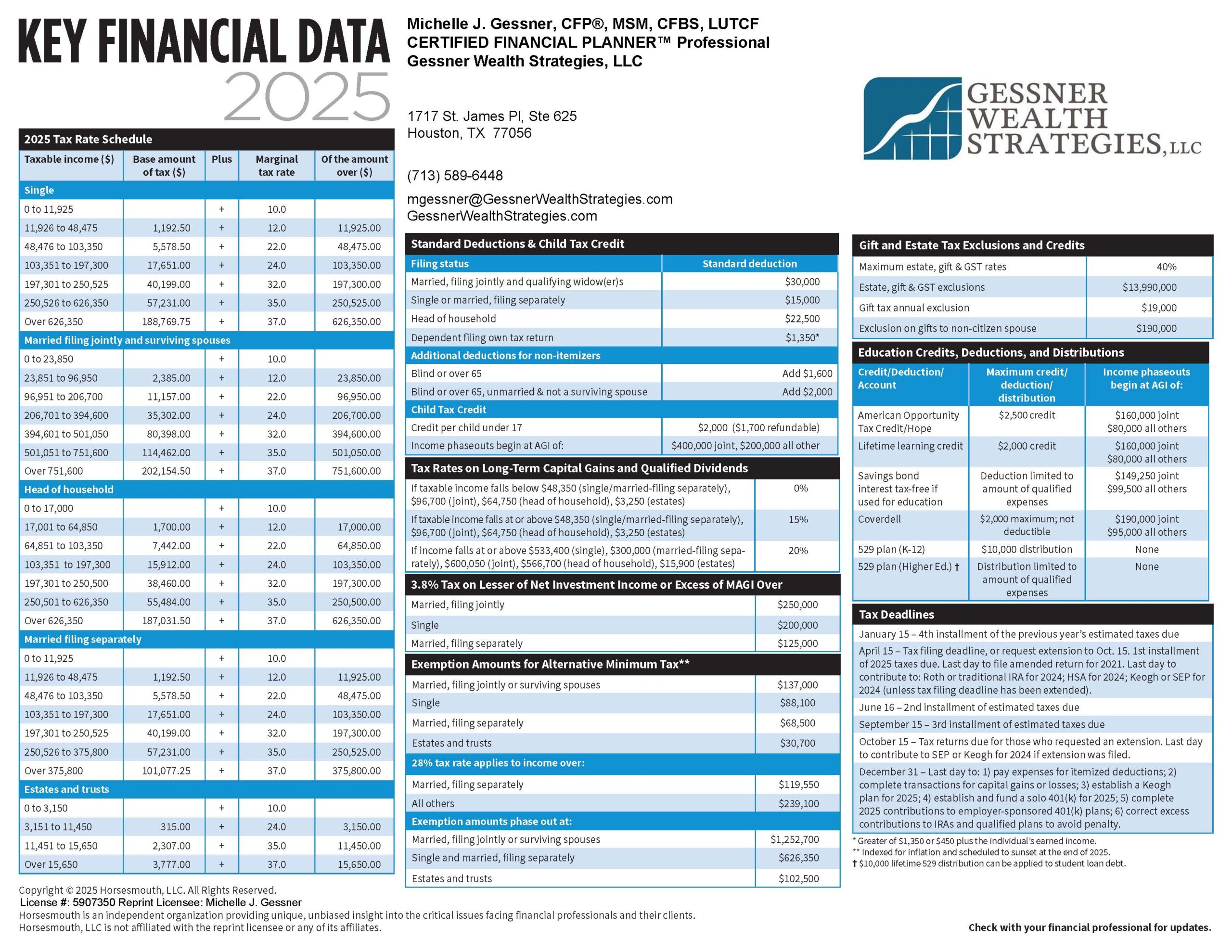Today, let’s turn our attention to women and their wealth. Based on available evidence, what are women’s most likely superpowers as they acquire and manage personal wealth? What vulnerabilities might they face for the same? Regardless of gender, how can each of us bring our unique talents to the table, harness our strengths, and break past debilitating stereotypes?
Financial Best Practices for All
To be clear, many financial best practices apply to everyone’s ability to secure their own and their family’s financial well-being. Regardless of your gender identity, we believe you and yours are best served by:
- Establishing personal goals and timelines, and crafting a financial plan for achieving them.
- Building and maintaining a low-cost, globally diversified investment portfolio accordingly.
- Sticking to your plans and portfolio over time; ignoring the mid-pursuit distractions.
- Blending in wealth management as needed to address risks, legacy goals, and more.
We also want to be careful about making sweeping statements about any group, including people who identify as women, men, or more nuanced individuals. Perhaps the most common trait among each of these “groups” is just how vastly diverse its membership can be.
Individuality is a good thing. But if we proceed judiciously (acknowledging every person and personality is unique), we can also be aware of the commonalities many women share, and lean into them when warranted. In this context, let’s take a look at what many (certainly not all!) women face along the road to financial independence.
Strength in Numbers
As we advise women about their wealth, some assumptions are actuarial, or data-driven. For example, time-tested statistics have long found that, in aggregate, women tend to outlive men. The most recent (2022) data available from the U.S. Centers for Disease Control lists a 50-year-old woman’s life expectancy as 82.8, while a 50-year-old man’s is 79.1. Girls vs. boys born today are projected to live to 80.2 vs. 74.8, respectively.
You may have valid reasons to believe your personal financial planning plug-ins don’t conform to these broad U.S. statistics. If you are a woman in a committed relationship with a man, your and your partner’s age spread, genetics, personal health, or lifestyle choices may suggest different assumptions are in order. But all else being equal, if you are more likely than your partner to become the surviving spouse or its equivalent, you’ll want to plan accordingly (even if we all hope you won’t need to rely on those plans for a long, long time)!
Longevity is not the only wealth challenge many women face. Their financial well-being may also be vulnerable to “bonus” threats related to their work/life balance.
Research suggests women may end up taking on the heavier load when it comes to child-rearing and household management responsibilities, as well as caring for aging parents. This, in turn, can lead to shorter or lower-paying careers. Again, this is by no means universal. And hopefully gender inequities are fading over time. But at least traditionally, women’s multitasking talents have often translated into fewer wealth-building opportunities in their lives.
Building Financial Stability
Is a woman’s reduced earning power a result of choice or necessity, nature or nurture, biology or biases? Most likely, it’s a muddy mix of all of the above. Financially, however, the results are clear: If you are the “lower-earning spouse” (per the Social Security Administration’s terminology), your circumstances merit extra financial planning to ensure you maintain an equal stake in your household’s total wealth—upfront, and as you age.
For example:
Self-Empowerment
Even if you’re not in charge of your household’s wealth management, we feel strongly in your being included in the broad strokes. How much wealth do you have? Where will you find it housed (which banks and/or brokerages)? What are your household expenses and debt loads? Who are your primary financial contacts (advisor, estate-planning attorney, insurance agent, and accountant)? How can you be in touch with them as required or desired?
Retirement and Healthcare Costs
When crunching retirement planning numbers, make sure the data factors in how long the surviving spouse (i.e., you!) might live, whether or not you are a prime breadwinner. Ditto, as you consider rising healthcare costs, particularly as they relate to securing long-term care resources as you age.
Benefit Distributions
Is your well-being being considered in planning for any pension and Social Security payouts? For example, if your spouse is thinking of taking their pension in a form that offers higher upfront payouts, but lacks survivor benefits … is that really in both your best interests? Social Security benefits should be scrutinized in similar fashion. For example, as described in this ThinkAdvisor article, the timing of when and how a higher-income earner claims their benefits can impact the lower-earner’s eligibility for spousal benefits.
Beneficiary Information
Review your household’s investment accounts, employer retirement plans, life insurance policies, wills and trusts, and similar documents to ensure any beneficiary designations protect and reflect your and your partner’s current intentions. For example, does an old will, IRA or insurance policy still list an ex-spouse as the beneficiary? Or is there wealth being transitioned directly to your children, potentially leaving you at risk?
Single or Married
By the way, these same suggestions still apply even if you are single—perhaps even more so, since there’s no pooling of the financial duties or dollars. No matter how big or small your household is, you’ll still want to plan for realistic numbers as you accumulate wealth and spend it down in retirement. You’ll still want to judiciously weigh your Social Security and pension payout options, and ensure your estate plans and insurance coverage remain relevant to your needs. Perhaps most importantly, you’ll still want to take charge of your personal wealth by remaining informed and engaged in its ongoing management.
The Softer Side of Financial Planning
Beyond your practical planning needs, there are other, more “squishy” assumptions to consider, related to your individual personality and mindset.
Here’s an intriguing exploration into our marvelous minds, taken from a 2024 Psychology Today piece, “A Short Journey Into Male and Female Brains”:
“Trailblazing research from the University of Pennsylvania found that women typically have a larger corpus callosum than men. The corpus callosum forms a bridge of communication between the left and right hemispheres of the brain. As a result, female brains exhibit extensive wiring between the left and right hemispheres. … This type of structure may facilitate social communication and intuition. In contrast, male brains with a smaller corpus callosum evince greater neural connectivity along the posterior-anterior dimension, which involves the linking of perception to action.”
In English, you can interpret this as meaning women tend to think more broadly (there’s that multi-tasking tendency again), while men may be better at focusing on one thing at a time.
But what does this have to do with financial planning?
Are You Being Heard?
From our perspective as a financial advisor, differences in different people’s mindsets mean we want to be aware of and sensitive to what our clients truly need from us, so we can be of greater assistance. We may be able to spout off all the facts and figures in the world, and provide endless agenda items and action plans. But if someone’s conversational nods mean they’re actually nodding off, that’s not on them. It’s on us. We haven’t listened to them. We are not doing our job. We need to reconsider our approach.
From your perspective, especially if you are a woman, you may have encountered these sorts of conversations throughout your life, where you’re hearing plenty, but you haven’t felt heard back.
This circles us back to the importance of being a willing advocate for yourself. Has your advisor left you out of the planning loop? Does it seem as if they’re not really listening to you, failing to acknowledge you in the conversation, or assigning you a secondary role in the conversations?
To be blunt, if your advisor isn’t fully present for you, it’s probably time to seek new advice!
Whether it’s with your financial advisor, your family, or anyone else, it’s helpful to acknowledge that each of us enters into every conversation with existing baggage that affects the tenor of the talk. Bottom line, if anyone—including your own inner voice—is suggesting you don’t need to be engaged in protecting your own wealth, we would suggest shifting to a new key in the conversation.
If we can assist with that, we would love to hear from you. Reach out to us today to get started.



